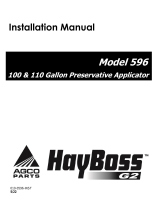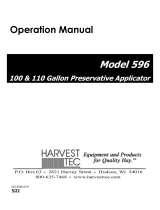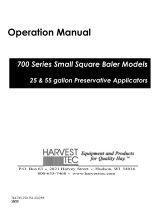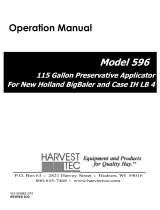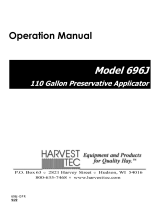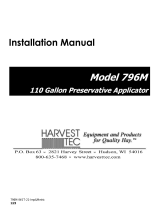Page is loading ...

1
Operation Manual
Model 491
100 & 110 Gallon Preservative
Applicator
Forage Harvester
491-16-OPR
6/22

2
(intentionally blank)

3
Harvest Tec Model 491 Operation Table of Contents
Page
Introduction
4
Installation Kit Reference Chart
4-5
Safety
5
Safety Decals
6
Safety Location
7
Preparing the applicator for operation
8
Filling the tank
8
Operation of the main ball valve
8
Connecting the power harness
9
Operation of the control
9
Understanding and using the control
9
Message light
9
First time and annual start up
10
Field operation
10
Calibration
10
Determining tons per hour for large square balers
10
Determining the rate of chemical
11
Selecting tips and setting pressure
11
General calibration chart for two nozzles
12
Maintenance
13-14
Maintenance schedule
13
Filter bowl cleaning
13
Miscellaneous maintenance
13
Tip & tip screen cleaning
14
Tank lid cleaning
14
Dielectric grease connections
14
Rebuilding pump
14
Battery connection
14
Winter storage
14
Troubleshooting
15
Parts breakdown
16-45
Tank, Saddle & Legs
16-18
Vermeer, Claas & Krone Balers
16
CNH, AGCO, Krone, John Deere L330 / L340 balers
17-18
Control Box, Wiring Harnesses, Gauge, Pump Assembly
19
Installation Kits
20-45
4438 Installation Kit
20
4439 Installation Kit
21
4490 Installation Kit
22
4491 Installation Kit
23
4492 Installation Kit
24
4494 Installation Kit
25
4495 & 4528 Installation Kit
26
4497 & 4529 Installation Kit
27
4498 Installation Kit
28
4499 Installation Kit
29
4500 Installation Kit
30
4501 Installation Kit
31
4509 Installation Kit
32
4510 Installation Kit
33
4511 Installation Kit
34
4514 Installation Kit
35
4515 Installation Kit
36

4
Table of Contents (continued)
Page
4518 Installation Kit
37
4519 Installation Kit
38
4525 Installation Kit
39
4525J Installation Kit
40
4527 Installation Kit
41
4530 Installation Kit
42
4537 Installation Kit
43
4539 Installation Kit
44
4540 Installation Kit
45
4541 Installation Kit
46
4542 Installation Kit
47
4544 Installation Kit
48
Notes
49-50
Warranty Statement
51
Introduction
Thank you and Congratulations on purchasing a Harvest Tec Model 491 Applicator. This applicator is designed
to apply a buffered propionic acid on to the forage crop as it is being baled. The applicator is designed to allow
the operator to adjust the rate of preservative on the go for changing moisture and baler throughput. This
manual will take you through the steps of operation of the applicator and also point out all safety precautions
that need to be made while using the applicator. Read this manual carefully to learn how to operate the
equipment correctly. Failure to do this can result in personal injury or equipment malfunction. If you are unsure
about operating the system after consulting this manual, contact your local authorized dealership for additional
assistance. If you are in need of parts for the system please see the parts breakdown in the back of this
manual and contact your local authorized dealer to order the parts. This applicator is designed to apply Harvest
Tec buffered propionic acid.
Right and Left sides are determined by facing in the direction of forward travel.
Installation Kit Reference Chart:
Baler Make
Model
Install kit
AGCO
4750-4755
4760
4790
4900-4910
4760 Roto-Cutter
4790 Roto-Cutter
7430
7430 Roto-Cutter
7433-7444
7433-7434 Roto-Cutter
030-4490
030-4494
030-4492
030-4491
030-4500
030-4501
030-4494
030-4500
030-4518
030-4519
CASE IH
8570-8575
8585
8580-8590
LBX331-432 Std or Packer
LBX331-432 Roto-Cutter
LB 333 – LB343 Std or Packer
LB 333 – LB433 Roto-Cutter
LB 433 (2011 and newer) Std or Packer
LB 433 (2011 and newer) Roto-Cutter
030-4490
030-4492
030-4491
030-4495
030-4497
030-4495
030-4497
030-4528
030-4529
CHALLENGER
LB33
LB34
030-4494
030-4492

5
Safety
Carefully read all the safety information and decals in this manual and on the applicator before use. Keep signs
clean and in good working order. Replace missing or damaged safety signs. Replacement signs are available
from your local authorized dealer. See your installation manual for under the replacement parts section for the
correct part numbers.
Keep your applicator in proper working condition. Unauthorized modifications to the applicator may impair the
function and/or safety of the machine.
Carefully read and understand all of the baler safety signs before installing or servicing the baler. Always use
the supplied safety equipment on the baler to service the applicator.
LB44
LB33B – LB44B
LB33B – LB34B Roto-Cutter
LB33B – LB34B Packer Cutter
030-4491
030-4518
030-4519
030-4527
CLAAS
2200 / 1200 / 3200 / 3400
2100
3300
030-4499
030-4509
030-4537
KRONE
VFS 88 & 128
VFS 88 & 128 Cutter
890 – 12130 XC
890 – 12130
030-4498
030-4495
030-4514
030-4515
BP 4x4, BP 4x4 HS
030-4539
890 XC High Speed
030-4540
1270, 1290, 1290HDP, 4x4 XC HS
030-4541
KUHN
LSB 870 – 890
LSB1270 – 1290
Omni-Cut
030-4510
030-4511
030-4525
JOHN DEERE
L330 / L340
030-4525J
MASSEY
FERGUSON
2050
2050 ROTO-CUTTER
2140 – 2190, 2250 - 2290
2140 – 2190, 2250 – 2290 Roto-Cutter
2150 – 2190 Packer Cutter
2170 XD Roto-Cutter
2250 & 2270 ProCut
030-4494
030-4500
030-4518
030-4519
030-4527
030-4530
030-4542
NEW IDEA
7233
7234
7244
7333
030-4490
030-4492
030-4491
030-4494
NEW
HOLLAND
590-BB940A Std or Packer
595-BB960A Std or Packer
BB940-BB940A Roto-Cutter
BB960-BB960A Roto-Cutter
BB9060 – BB9080 Std or Packer
BB9060 – BB9080 Roto-Cutter
BB9080 (2011 and newer) Std or Packer
BB9080 (2011 and newer) Roto-Cutter
030-4495
030-4495
030-4497
030-4497
030-4495
030-4497
030-4528
030-4529
VERMEER
SQ2731
SQ3347
030-4438
030-4439
VICON
LB 8200
LB 12200
030-4510
030-4511

6
Safety Decals
Number 1
Spraying hazard. Disconnect power before servicing the
applicator
Part no. DCL-8003
Number 2
Falling hazard. Do not step in this area.
Part no. DCL-8002
Number 3
Use caution when working around chemicals. Wear all
protective equipment according to the label of the
product.
Part no. DCL-8001
Number 4
Read and understand the operator’s manual before using or
working around the equipment.
Part no. DCL-8000
Number 5
Open (unlocked) and closed (locked) position of the ball valve.
Part no. DCL-8004

7
Safety Decal Locations
3, 4, 5
1
3, 5
2

8
Preparing the applicator for operation
After the Applicator has been installed on the baler, follow the below steps to prepare for operating the
applicator both safely and correctly.
Filling the tank:
Read the label of the product being filled into the tank to determine what individual protective measures need
to be taken. Locate the drain/fill line on the baler. Open the cam-couplers (A) and remove the protective plug
(B). Insert the male coupler (found on transfer pump) into the female cam and close the cams (A). To open the
ball valve (C) turn the handle so it is vertical. After the ball valve has been turned on switch the pump to the On
position. Monitor the level on the tank visually and shut off the pump before over filling. Once the pump is
turned off, close the ball valve and remove the male coupler. The handle of the ball valve (C) will be horizontal
when closed. Reinstall the protective plug and close the cams. The Harvest Tec model 9212 transfer pump is
recommended for this process.
Water is recommended for first time and annual start up procedures.
Operation of the main ball valve
The ball valve should be closed at all times when the applicator is not being used. The valve should also be
closed when any service work is being done to the baler or applicator.
The valve is located next to the pump and by the applicator tank. The arrow below points at the valve.
Valve open
Valve closed
Drain/Fill line on the baler
A
B
Enlarged view of the drain/fill line valve
and cam-coupler assembly.
A
C

9
Connecting the power harness
The power harness that supplies power from the tractor battery to the applicator pump has a disconnect at the
hitch. Connect the two together for operation. Always disconnect before servicing the applicator or baler.
Operation of the Control
Understanding and using the control
The model 457 control is pictured below. The toggle switch (A) is used to supply and cut off power to the
pump. With the switch in down (shown) the power is off. Lift the switch up to supply power. The dial (B) is used
to adjust the pressure to the tips when power is applied. Use the numbers on the dial only as reference. The
PSI on the gauge determines the exact flow. Apply the correct rate decal found with your manual to the front of
the control box. The message light (C) will always be illuminated when the power is on. If the light ever blinks
during operation please reference the manual section “Message light”.
Message Light
The LED under the speed dial will be steady on when the applicator is running under normal situations. If the
light blinks on and off use the information below to interpret the message.
Slow steady on and off blink: The system is attached to hay indicators (474A) or a foot switch. This message
means that the pump is paused. Light will come on constant once the baler is back in the windrow.
Two quick blinks: The pump motor or pump harness is shorted.
Three quick blinks: Pump motor is over the current limit (10 amps).
Four quick blinks: Power is under current from a bad connection.
Control box must have the on/off switch toggled to clear the message after the fault has been fixed to clear.
A
B
C

10
First time and annual start up
After familiarizing yourself with the model 457 control, fill the tank with 5 gallons of water. Turn on the power to
the pump by pushing the toggle switch up. You might hear the buzzing of the motor. Turn the dial on the
control box until the pressure gauge starts to climb. By turning the dial clockwise the pressure will go up. By
turning the dial counter clockwise the pressure will decrease. With the applicator spraying at about 30 PSI, look
for leaks at all the hose connections and fittings. When you are comfortable with the operation of the controls
you can set the applicator to apply the amount of chemical you would like it to put on.
Field operation
Calibration
There are three things that you need to know when calibrating your applicator. First you need know how many
tons per hour you bale. Second you need to know the rate, or how many pounds of product to apply for a given
ton per hour. Finally you need to know what tips to use and at what pressure to set the gauge.
Determining your tons per hour
1. Time 3 bales and average the time it takes to make a bale.
2. Estimate the weight of the bale.
3. Use the Bale Rate Chart below to determine the tons you are harvesting per hour.
Example: You are baling 1000 pound bales, with 2 minutes of time per bale. Looking at the chart below your
tons per hour is 14.
Large Square Bale Rate Chart (tons per hour)
Weight per bale

11
Determine the Rate of Chemical
The number of pounds of chemical required to be applied to a given ton of hay, depends on the moisture and
the type of chemical used. The moisture of the hay is important in determining how much chemical to use. By
knowing the moisture, you can make sure you are treating the hay correctly. Under applying will save money
but spoilage most likely occurs. Over applying will waste money however, the hay will be saved. Some
chemicals require more or less to treat the same amount of hay. To find the exact number of pounds required,
for a given hay moisture, refer to the label on the drum or contact the manufacture. Harvest Tec applicators
come with a set of low, medium, and high tips. If your chemical requires rates other than what these tips
deliver you will need to purchase them through your dealer.
Selecting Tips and Setting Pressure
Once you have determined your tons per hour and the amount of chemical needed for the moisture you are
applying at, you can select your tips and determine your gauge settings.
1. Multiply the tons per hour by the amount of chemical required for the moisture you are applying at. This
sum will give you the application rate.
2. Select the proper set of tips from the application rate chart and install them.
3. For the tips you have selected, you will need to keep the gauge at the recommended PSI to achieve the
proper application rate.
4. Set the pressure by adjusting the dial on the control box and by reading the pressure of the gauge to
match the desired rates. The numbers on the dial are for reference only. Rate is determined by
watching the pressure gauge.
Example: You are baling at 12 tons per hour with your large square baler. The moisture that you are baling at
requires you to apply 6 pounds per ton. Multiply the 12 tons x 6lbs = 72 lbs per hour. Using the chart on
page 28 you will notice the orange set of tips at 20 PSI will give you that output.

12
General calibration charts
Pounds per hour with two nozzles
Gallons per hour with two nozzles
YELLOW
ORANGE
GREEN
BLUE
BROWN
SET
SET
SET
SET
SET
800067PT
TT11001VP
TT10015VP
TT11003VP
TT11005VP
PSI
15
5.2
7.3
10.7
22.0
31.9
20
5.6
8.4
12.7
24.1
42.2
25
6.3
9.5
14.1
28.3
47.3
30
7.0
10.3
15.5
31.0
52.2
35
7.5
11.3
16.6
33.5
40
8.0
12.2
17.8
36.0
45
8.4
12.6
19.2
38.3
50
8.9
13.2
20.6
40.7
55
9.3
13.8
21.3
42.5
60
9.7
14.4
22.0
44.4
*ONLY THE OPERATOR CAN DETERMINE HOW MUCH PRODUCT IS APPLIED.
YELLOW
ORANGE
GREEN
BLUE
BROWN
SET
SET
SET
SET
SET
800067PT
TT11001VP
TT10015VP
TT11003VP
TT11005VP
PSI
15
42
64
95
196
323
20
49
74
111
222
376
25
53
80
122
249
413
30
60
90
138
275
461
35
65
98
148
296
40
70
106
159
317
45
74
111
170
336
50
78
117
180
354
55
81
122
188
370
60
85
127
196
386
Comes w/ applicator kit
Comes w/ applicator kit

13
Maintenance
• If you are unsure how to perform any of the maintenance steps have your local authorized
dealer perform the tasks.
Maintenance Schedule
Daily
10 hrs
400 hrs
Weekly
Monthly
Season
Filter bowl cleaning
X
X
Tips & tip screen cleaning
X
X
Tank lid cleaning
X
X
Dielectric grease connections
X
X
Rebuild pump
X
Battery connections
X
X
Visually inspect hoses
X
X
Filter bowl cleaning: Before cleaning the filter bowl all personal protective equipment must be worn (Face
shield or goggles, chemically resistant apron, boots, and gloves).
Verify that the ball valve located next to the pump is turned off. Locate the filter bowl on the side of the pump
manifold (A). Unscrew the bottom section of the filter bowl and remove the strainer (B). Clean off any debris
and soak in warm water with a mild soap if necessary. Once the screen is clean reinstall by following the
directions in reverse.
Miscellaneous maintenance:
1. Depending on the product being used, the system may need to be flushed with water at a regular
interval (consult with manufacturer of the chemical). If Harvest Tec product is being used, flushing is not
necessary.
2. Although the pump can run dry, extended operation of a dry pump will increase wear. Watch the
preservative level in the tank.
3. If you are using bacterial inoculants, flush your system daily after every use.
A
B

14
Tips & tip screen cleaning: Before cleaning the tips and screens all personal protective equipment must be
worn (Face shield or goggles, chemically resistant apron, boots, and gloves).
Verify that the ball valve located next to the pump is turned off. Disconnect spray shield from hangers if
possible or remove tips in place. Remove the tip, and screen. Some models may require a wrench to remove.
Clean off any debris and soak tip and screen in warm water with a mild soap if necessary. Once the tips and
screens are cleaned reinstall by following the directions in reverse.
Tank lid cleaning: Before cleaning the tank lid all personal protective equipment must be worn (Face shield or
goggles, chemically resistant apron, boots, and gloves).
The tank lid is located on the top of the tank. Use the supplied handle on the tank to secure your person and
use the other hand to remove any debris from the top of the tank. Unscrew the tank lid and bring down ground
level. Use compressed air clean out the tank screen (D). If the screen cannot be thoroughly cleaned with
compressed air, replace fitting (005-9022B3). Once the screen is cleaned reinstall the cover.
Dielectric grease connections: Disconnect all harnesses on the applicator, clean the connections, and
repack with dielectric grease.
Rebuild pump: If the pump is not working up to specifications a pump rebuild kit may fix the problems.
Verify that the ball valve is turned off. Before working around the pump all personal protective equipment must
be worn (Face shield or goggles, chemically resistant apron, boots, and gloves). Disconnect all pump fittings
and remove pump from saddle. Follow rebuild instructions supplied with pump rebuild kit. Reinstall after rebuild
is complete.
Battery connections: Follow the batteries safety warnings and clean the battery connections. If the
connections cannot be cleaned, replace harness.
Winter Storage
1. Thoroughly flush the system with water.
2. Remove the filter bowl and run dry until the water has cleared out of the intake side.
3. Remove the red plug from the bottom of pump, drain, and run the pump for 30 seconds or until dry.
4. Drain all lines on the outlet side.
5. Never use oils or alcohol based anti-freeze in the system.
6. For spring start-up, if the pump is frozen, turn off the power immediately to avoid burning the motor out
or blowing a fuse. The pump head can be disassembled and freed or rebuilt in most cases. Check the
fuses after the pump has been freed.
7. Disconnect power from the applicator
8. Remove display from tractor and store in a warm, dry place.
D

15
Troubleshooting
PROBLEM
POSSIBLE CAUSE
SOLUTION
Pump will not run.
1. Circuit breaker tripped on
electronic unit.
1. Check for short, low voltage, and
reset breaker.
2. Pump locked up.
2. Clean or rebuild pump.
3. Damaged wire.
3. Repair damaged wire.
4. Vapor locked.
4. Loosen hose by check valve at
gauge and bleed air.
Pump runs but will not prime.
1. Air leak in intake.
1. Tighten fittings on intake side.
2. Clogged intake.
2. Clean.
3. Restricted outlet.
3. Check and clean tips.
4. Check valve on outlet
stuck closed.
4. Clean or repair check valve.
5. Dirt inside pump.
5. Replace pump check valve.
Pump does not develop enough
output.
1. Air leaks or clogs on inlet
side.
1. Tighten or clean filter bowl
assembly.
2. Electronic box out of
adjustment.
2. Refer to box adjustment page.
3. Pump worn or dirty.
3. Rebuild pump.
4. Low supply voltage.
4. Check voltage at connection with
voltmeter.
5. Bad gauge.
5. Gauge should read less than 10
PSI when not in use. Also tips
should lose spray pattern below 10
PSI. Check accuracy.
Pump output varies.
1. Clogged or restricted inlet.
1. Clean
2. Worn pump parts.
2. Rebuild pump.
Message light blinks two times
1. Pump or wire harness
shorted.
1. Check harness running to pump
and verify no shorts or problems.
2. Check to see if pump motor is
locked up. Repair or replace.
Message light blinks three times
1. Pump is drawing greater
than 10 amps.
1. Check to see if motor is running
correctly. Repair or replace.
Message light blinks four times
1. Undercurrent coming to
control box.
1. Check all battery connections and
connections running up to control
box.

16
Parts Breakdown
Tank, Saddle & Legs 100 Gallon
Vermeer, Claas, and Krone Balers with 100 gallon tank
*If the applicator is being mounted on a Krone 870 HDP baler, two leg adapter brackets will be needed for
proper tank leg installation (below). Part number 001-6707KV.
Tank Saddle
001-6706A
Tank Straps
001-4402
100 gal Tank
005-9206
Tank Lid
005-9022C
Tank fittings 3/4”s
005-9100
Not Pictured: Elbow
003-EL3412
Vermeer, Claas and Krone
Balers Saddle Legs
Part#: 001-6706V
Claas 3300 Saddle Legs
Part #: 001-6706C

17
Tank, Saddle and Legs 110 Gallon
Tank-110 gallon
Part#: 005-9208
Hand Rail
Part#: 001-6707HR
Tank Lid
Part#: 005-9022E
or 005-9208L
Tank Saddle
Part#: 001-6707A
Tank Straps
Part#: 001-4402B
Tank Fitting
Part#: 005-9100
Not Pictured: Elbow
Part#:003-EL3412
New Holland BB940A, BB960A,
Case IH LBX 332, LBX 432 Series
Saddle Legs
Not Pictured:
Vicon Leg Spacers:
Part#: 001-6707BS (x2)
Handrail:
Part#: 001-6707HR (x1)
Right Leg Part #:001-6707BR
(2010 and older 4 ft wide)
Left Leg Part#:001-6707BL
(2010 and older 4 ft wide)
Agco, Hesston, Massey &
Challenger Saddle Legs
Part#: 001-6707C

Tank, Saddle and Legs 110 Gallon (continued)
Krone Balers
Part#: 001-6707KA
Left Leg Part#: 001-6707DL
(2011 and newer 4 ft wide)
Right Leg Part #: 001-6707DR
(2011 and newer 4 ft wide)
New Holland BB940A, BB960A,
Case IH LBX 332, LBX 432 Series
Saddle Legs
John Deere L330 / L340
Part#: 001-6707J

19
Parts Breakdown for Control Box and Wiring Harnesses,
Gauge, and Pump Assembly
Ref
Description
Part #
Qty
Ref
Description
Part #
Qty
1
Speed dial
006-2022A
1
9
Power lead
006-4580M
1
2
U-bracket
001-2012E
1
After Serial # 4550
3
Control box knob
008-0923
2
10
Box Plug
006-4581M
1
4
Control box enclosure
006-2015A
1
After Serial # 4550
5
Control box cover
006-2015B
1
11
Gauge
002-2208Z
1
6
Pump lead
006-4583
1
12
Gauge Bracket
001-4714
1
7
Box Plug
006-4581
13
Tee
004-TT14
1
Pre-Serial # 4549
14
Elbow Fitting
003-EL1412
1
8
Power lead
006-4580C
1
15
Straight Fitting
003-A1212
1
Pre-Serial # 4549
Ref
Description
Part #
Qty
1
Pump
007-4120S
1
2
Elbow
003-EL3812
1
3
Reducing Nipple
003-M1238
1
4
Street Elbow
003-SE12
2
5
Filter Bowl
002-4315
1
6
Nipple
003-M1212
1
7
Ball Valve
002-2212
1
8
Elbow
003-EL1212
1
1
5
8
2
5
3
3
4
4
4
6
7
1
3
AGCO Balers Only
Non-AGCO Balers
2
1
Ref
Description
Part #
Qty
1
Pump
007-4120S
1
2
Elbow
003-EL3812
1
3
Reducing Nipple
003-M1238
1
4
Filter Bowl
002-4315
1
5
Street Elbow
003-SE12
1
6
Nipple
003-M1212
1
7
Ball Valve
002-2212
1
8
Elbow
003-EL1212
1
NP
Straight Fitting
003-A1212
1
(L330/L340 Only, Replaces 003-EL1212)
3
7
6
8
5
3
1
6
8
2
4
9
5
10
7
13
14
11
12
15

20
Harvest Tec Model 4438
Ref #
Description
Part #
Qty
Description
Part #
Qty
1
Spray shield
001-4438A
1
Tip Kit (Complete)
030-9007
1
2
Shield holder
001-4438B
1
Tip Kit Includes:
3
Plug
003-F14
1
Plastic Box
008-9000
1
4
Tee
003-TT14
2
Orange cap (Orange Set)
004-1207J
2
5
Lynch pin
008-4576
2
Tip (Orange Set)
004-TT11001VP
2
6
Nozzle body
004-4710
2
Green cap (Green Set)
004-1207A
2
7
Check valve
004-1207V
1
Tip (Green Set)
004-TT110015VP
2
8
Hose clamp
003-9003
3
Blue cap (Blue Set)
004-1207C
2
9
Straight Fitting
003-A1412
3
Tip (Blue Set)
004-TT11003VP
2
10
Hose
002-9001
1
Brown Cap (Brown Set)
004-1207K
2
Tip (Brown Set)
004-TT11005VP
2
Washer
004-1207W
8
Tip Strainer
004-1203-100
2
5
1
2
3
4
5
6
7
8
9
10
/

